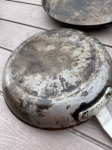The Over-the-Hill Gang: Non-specific and sometimes irreverent seniors' stuff
When my Dad had his bypass surgery many years ago, he had a small contraption that you could put away in a closet when it wasn't in use. It was just a pair of pedals attached to a very small triangular frame. You sat in an armchair and pedaled with your feet, just to keep moving. It didn't put any pressure on the knees and was really more for mobility and cardiovascular purposes than anything else. That's what I was thinking about, not a large piece of equipment. But I have no idea whether it would be helpful.
LisaT, standing desks have fascinated me for years. It's a very cool concept. I have even seen adjustable desks that can be used sitting down, then levered up for use in a standing position. If I were still working I would probably be trying to buy one. (But as I type that I realize that I'm using a computer right now, while sitting on a chaise, and maybe what I need to do is take the laptop to a counter or other higher surface and use it while standing up!)
PeggyC said:
LisaT, sending all possibly positive vibes for your check-ups. How can you lose insurance if you've made payments on time??? That sucks.
Ah good news. After they refused to take payment over the phone earlier because they said I was one day past the grace period, I went to their website and paid. Payment went through and they agreed to reinstate me. It was the Federal Healthcare Marketplace that took our subsidy away, so while I was having automatic payments withdrawn from my bank account, the premiums changed. While I was making phone calls to the marketplace, and using the website, and figuring out how to send documents to verify the information they wanted, a grace period had begun unbeknownst to me, and then ended. Everyone I spoke to was trying to help and very apologetic, acting as if a runaway train was directing us. In the end it was all right, just a bit harrowing.
I am now going to brush my teeth with my left hand. Good night!
Donna Rose said she's happy for anyone to contact her via her website, Facebook or email details. She'll Skype, too. She's American, so you'll understand her 
http://www.thebodymoves.com.au/bm/
Some of the stuff we did today involved investigating how the angle of our chin and or eyes may affect the stretch and curve required to lift a knee (in other direction) or slowly swing an outstretched arm...all while lying on the floor. Half the class was mental visualisation. Some felt like dancing the charleston, except only parts of our bodies did parts of the movements. Parts of the class felt like easy ballet class. Part of the class was self-monitoring ('listening') as we walked around the room. I spent a good chunk of it laughing.
By the end of the class, the tightness at the end of my tailbone had eased, my neck had stopped spasming, and I had answers for how to handle another episode like the other night. Further (to my surprise and delight) I could not only walk down steps, I nimbly walked down two flights at a fast pace, and I had never walked these steps before. I usually don't handle stairs well at all
Something that may help people with Parkinson's :
http://www.abc.net.au/news/2015-06-03/parkinsons-patients-punch-their-way-to-improvement/6520034
OK. To help people with arthritis or stiff/sore joints:
This article, from the Feldenkrais Resources site, is reproduced from Arthritis magazine. You don't have to read the whole article, on the second page there's a seated exercise, asking you to explore some micromovements as you move your neck, eyes, legs etc.
http://www.feldenkraisresources.com/v/vspfiles/assets/images/asm_jf13_feldenkrais(1).pdf
A demonstration clip for arthritic/swollen knees, using a seated position. Five minutes work for fast results.
This practitioner leads her discussion differently to the way I'm used to, so while you follow please also pay attention to what happens with your awareness, with your breathing, which parts of your body want to get involved to make the required movement, and which parts or thoughts are resisting. What would your body need to do to make the movement easier, smoother, more effortless? How would you do this in daily life?
http://youtu.be/zoLIXL2nsO8
Joanne, what have you got by way of mental exercises? I hate the games on the computer, unfortunately, so Lumosity didn't work for me.
I feel a bit panicky lately because I am struggling more than usual to find appropriate words when I'm speaking. Probably because of stress (and Meniere's Disease/migraines), but it is beyond frustrating, and I get scared thinking that if I don't work on it now, I will end up like Mom.
It always struck me as particularly horrible that a writer who was so intensely verbal and had such a wonderful memory was brought to the point of being involuntarily incommunicado for the last year or two of her life. I could see the frustration and pain in her eyes as she labored vainly to find words to express what was happening, or to even understand what was happening to her. 
Fear limits you. It also stifles your breath (literally: it changes the shape of shoulders and chest cavity, so you change the pace of your breathing and also how much you fill your lungs); it throws you off-balance; delays your responses to stimuli and the uncertaintity you feel leads to shorter steps taken with less if your sole firmly planted on the ground. It's not a great companion.
I was just learning about adaptability, perceptions and responsiveness. Practising mindfulness for even 10 minutes each day can help you to bring your awareness quickly to a task or a situation so that your breathing and heartbeat can come back to a slow, relaxed rate. We learnt that in the radio studio, you know that from singing: to quell nerves and increase the resonance of your voice, breathe smoothly from the diaphragm and refocus on the moment. Focus on the task. Visualise a positive outcome.
Did you know some meds or combinations of meds can make some people feel more fearful? If D adds a particular hay fever spray to his combination of daily meds, he gets jumpy, and can't plan properly for more than a day. But he swears he's OK. We checked for drug interactions, and now we know what to avoid (pharmacist has the list!).
For vocab, I'm using the kinesiology in Feldenkrais to help with new neural pathways. I'm also practising my other languages: music, reading online articles, watching the occasional foreign language program. And I'm playing loads of Word Chums (online Scrabble) with friends (join me?). I'm not into cards but playing cribbage was fun and relatively easy to pick up; my ladies play various forms of Rummy. What's good for maths is good for words and music. Strategy games are good: chess, bridge, backgammon etc .
I have a bunch of board games and kids card games that I don't use and mostly we never did use, but I think it would be great mental exercise. For instance, who sunk my battleship? is terrific for spatial relationships, etc. I have thought for many years that having a brain gym for people to go to and keep track of progress using game, etc. would be a good business model. Even though I think I could design the business, I don't like running businesses.
Would Rick join you in a partnership for a part-time games club? Or could you add a program into an established community centre schedule?
lisat said:
I have a bunch of board games and kids card games that I don't use and mostly we never did use, but I think it would be great mental exercise. For instance, who sunk my battleship? is terrific for spatial relationships, etc. I have thought for many years that having a brain gym for people to go to and keep track of progress using game, etc. would be a good business model. Even though I think I could design the business, I don't like running businesses.
This is quite similar to what Lumosity actually does. Only I learned when I was a child to detest all games, because I was the youngest in the family and therefore never, ever won when the family played games. Yet I was very competitive and really minded that I never, ever won, and my parents and my brother didn't figure out for decades that it was a bad idea to tease me about it until I was in tears, running down the hall and slamming my bedroom door.
Hate games. Hate them. 
But you're a good wordnerd and want to win at competition, so you can learn to change your view in that sufficiently to enjoy the challenge of finding the words in your rack, and the moves to either block or enhance a game.
*sigh*
My mortality just took another blow, with the passing of Ronnie Gilbert, the gorgeous, belting, alto voice of The Weavers.
Another piece of my childhood gone.
Just thinking the same thing.
*************
Different topic: how do we know if we're on track, and reasonably sure to last at least another 5 years? We all like to make some plans, with an aim to seeing them through, don't we? I've just read about an intriguing UK online tool that helps users assess their 'risk of dying in the next 5 years' as measured against the UK BioBank stats.
http://ubble.co.uk I know that the UK data isn't firm for here, and it won't be for the USA either. And not everyone wants to know. But I suspected to learn the same stuff my doctor tells me...instead, I have the same risk as a British woman over 10years younger than my current age.
One of the behavioural predictors the researchers found more accurate is surprising, and we've discussed it recently. Walking pace. Your step length and pace can add to your risk more than behaviours such as smoking. So it really is pretty important to find ways to step out confidently, more often, even if the most you can manage is under supervision on a walking machine, hanging on to the sides for safety.
I do NOT want to know. Color me cowardly. But, if anything, my walk is a little over-confident!
I don't want to know either - but suggest that we all have a plan in place.
My sister-in-law died on Saturday - she never recovered from a stroke she had 3 years ago - but her husband, Denial (some of you might recall Denial from my MIL rantings), always thought she would get better. They never discussed "the end game" - he still has no plan in place - we've tried to guide, but final decision is his. Very sad really. So write out your end game desires and give copies to a couple of people who will out-live you. My mom actually did that - paid for everything in advance too so the only cost left was shipping her from AZ to MD.
I'm so sorry to hear about your SIL, Soorlady. You can only do what Denial will allow you to do; for the rest, if he has made it more difficult for himself, so be it. You can't help people against their own wishes. But it is very sad.
My mother expressed many of her desires years ago, so I knew what to go on when she actually died. Thank goodness she had told me what she wanted to happen, or I wouldn't have had a clue when the time came, because she was in advanced dementia and had a terrible time communicating anything toward the end. Before that, my father had taken care of all the estate planning and so on, and it was all quite streamlined and organized before he died, and Mom left his arrangement in place.
I am going to have to take care of my own intentions soon, I think, since I have inherited certain things of value from Mom. I need to make sure my wishes are known and will be followed should anything happen. I've already told my husband I would prefer cremation to burial, and for the rest of the funeral arrangements... I honestly don't think I care what happens, if anything.
Oh, soorlady, I'm so sad to hear this!
Your family's due for some quiet peace and good health. May it come soon
Well, this has made my day! 
http://www.abc.net.au/news/2015-06-09/study-finds-caffeine-combats-stress-memory-loss/6530818
That makes me feel better about my tea habit. 
I also saw an article this week that said bacon was actually good for you, contrary to all recent reports.
It's a good week for breakfast. ;-)
It's feeling bitterly cold today, as only the seaside can. Yet, surprisingly, it's around 18degrees C (mid80s ?). I haven't checked the temperature conversion. Cooked breakfast and hot coffee before stretching and twisting seems the way to go, today. (I have time for all to settle)
Interesting that the article referenced another study that suggested the social interactions may be what provides the health benefits: a few years ago there was a research summary in New Scientist looking at healthy communities. I remember reading we need a Christmas card list of 80 to 150 names, and about a third of that number for daily social interactions, in order to stay positive and healthy. The social interactions doesn't have to be '30 different people', but '30 interactions' for example. MOL interaction counts!
I'm sorry, that is completely insane. Introverts would go absolutely nuts and die of anxiety if they had that many social interactions on a daily basis. Who the hell did that research???
Although if MOL and other online activity counts, I'm good. 
I'll see if I can find a reference to it somewhere. It's based on averages, and on things you wouldn't even realise count so that what at first seems extraordinarily high is really quite reasonable.
Surprisingly, the number of interactions has been found to be quite stable for urban and non-urban communities, and even in societies over the last 400yrs or so, even as communities changed and communication & technology changed. (Apparently even chimp and great ape communities have similar patterns, but I'm not sure of exact numbers). The nature of interaction has changed, in context and content.
New report on protein and senior health:
http://www.nlm.nih.gov/medlineplus/news/fullstory_153010.html
Re the social connections research: I haven't yet found the research I was thinking of the other day. However, I have a more recent UK paper looking at health impacts of social connection, and social isolation, as people age. In particular some of the figures and charts on p12 are revealing: the wellbeing impact of decreased connections seems to leap off the page.
http://www.ilcuk.org.uk/images/uploads/publication-pdfs/SOCIAL_NETWORK_WELLBEING_final.pdf
Aha! I was thinking of Dunbar's Number!  and, as usual, got it slightly wrong...
and, as usual, got it slightly wrong...
https://community.dur.ac.uk/r.a.hill/Hill%20and%20Dunbar%202003.pdf The paper
http://en.wikipedia.org/wiki/Dunbar%27s_number wiki on Dunbar etc.
http://whatsthepont.com/2014/03/05/150-swedish-tax-inspectors-the-monkeysphere-and-stable-work-groups/ Fun article on applying Dunbar, with thought provoking comments and related articles
What a week it has been - we buried Denial's wife on Wednesday, Mother-in-Law had a heart attack on Thursday and died on Friday. Today was a whirlwind of various arrangements. Her funeral is Monday. A few family members flying in tomorrow. Again - I urge you to write out your end game wishes - I think I'll even add ideas for the service in my instructions. That way, no one will have to think.
Rentals
For Sale
Garage Sales
-
Multi Family Garage Sale Sale Date: Apr 20, 2024
More info













I have been standing up more as I use my computer. Not a standing desk, but the back of the chair I usually sit it. Over stuffed. Just standing while typing is a good break. I like it more than I thought I would.